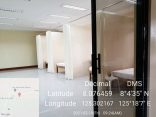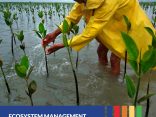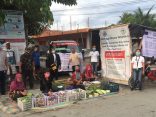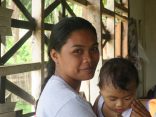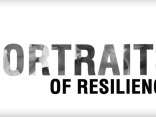The College of Social Work and Community Development (CSWCD) in the University of the Philippines Diliman is a recognized leader in the field of social development. A vital part of the CSWCD education is the Field Instruction Program (FIP), where students are immersed in communities to get a feel of the people's experiences and share their learnings in the classroom. The end of 2013 saw something new for the program – the strongest storm of the century – Typhoon Yolanda or Haiyan.
In photo: The first batch of CSWCD interns in Leyte smile for the cameras
The College of Social Work and Community Development (CSWCD) in the University of the Philippines Diliman is a recognized leader in the field of social development. Guided by the principle of praxis – a process by which ideas and their actual practice enrich each other – the college has produced graduates with public service instilled in their very lives.
A vital part of the CSWCD education is the Field Instruction Program (FIP), where students are immersed in communities to get a feel of the people's experiences and share their learnings in the classroom. The college has partnered with various non-government organizations (NGO) and people's organizations previously, with the communities mostly in Luzon. The end of 2013 though brought something new – the strongest storm of the century – Typhoon Yolanda (international name: Haiyan).
The College of Social Work and Community Development (CSWCD) in the University of the Philippines Diliman is a recognized leader in the field of social development. Guided by the principle of praxis – a process by which ideas and their actual practice enrich each other – the college has produced graduates with public service instilled in their very lives.
A vital part of the CSWCD education is the Field Instruction Program (FIP), where students are immersed in communities to get a feel of the people's experiences and share their learnings in the classroom. The college has partnered with various non-government organizations (NGO) and people's organizations previously, with the communities mostly in Luzon. The end of 2013 though brought something new – the strongest storm of the century – Typhoon Yolanda (international name: Haiyan).

With some of the kids from Barangay Cagbuhangin in Ormoc, Leyte
A different experience
"It was a historic disaster," said Dr. Aleli Bawagan, Associate Professor at CSWCD. "We were just about to start the second semester's FIP when it hit Leyte. The damage was such that we cannot help but think of doing something. Our students also wanted to help out. Leyte was far away and we had no partner NGO to work with once there. Fortunately, one of our alumni connected us with ACCORD and things went from there," she adds.
The situation then dictated that preparations should be quick. Dr. Aleli with two colleagues and ten students (six from BS Community Development and four from BS Social Work) were briefed on ACCORD's humanitarian response. Soon enough flights were booked and an office set up in the field. On the morning of November 25, 2013, Dr. Aleli’s group found themselves in Ormoc, Leyte.
She recalls that the experience was different from their previous field areas. "Security was a concern – there were reports of escaped prisoners in nearby Tacloban. There was no power. Infrastructure like roads and hospitals were down. And there was so much to do, given the enormous needs of the affected people.”

Interns hard at work during a distribution of non-food items
Stretched but did not break
She noted that the students’ work was “physically taxing – they had to wake up early to go to the communities. They were responsible for organizing and conducting food and shelter kit distributions. When they got back to the office at night, they had to encode and prepare reports as well as plan for the next day’s set of activities.”
Still, Dr. Aleli can’t help but notice the changes in the students in those 3 months. “ACCORD trained our students well. Mas naging maabilidad sila (They became resourceful). They worked as a team with the (resident) staff and with each other.” Dealing with barangay captains, teachers, and even mayors, they learned to adjust and negotiate. "How could it not be when you have to explain to a community member that no, he cannot take two food packs when the others are only given one each?”
What was most notable for her was the fact that, “They (students) were stretched to their limits but they did not break. They cannot help but be inspired with what they see in the communities day-in, day-out – how people supported each other, the optimism, the strength of character in those who were left with nothing but still go on.”
Some of those students are now ACCORD staff. “Before their fieldwork in Leyte, I don’t think they would have considered such a line of work. The relationships they built compelled them to do their part and contribute,” she says.

A little downtime for the interns
Continuing
Dr. Aleli is also humble enough to admit that the college did not only contribute to ACCORD’s work, but also learned from it. She said, “Their practices were really advanced. They encouraged officials to keep detailed population lists, with vulnerable groups such as the elderly prioritized for aid.” She also notes that “Unlike other NGOs, they went the distance – literally – to far-flung barangays. And they worked hard at ensuring participation in all aspects of their operations, understanding that these people have been through a lot and should not be made to beg or quarrel with each other for the help they all deserve.”
The college’s fourth batch of students has just returned from Leyte, where they supported the development of diversified livelihoods and capacity building on disaster risk reduction, leadership, and financial management. The partnership between ACCORD and CSWCD looks to continue, learning from each other while empowering communities to chart a path of resilience and development.
(all photo credits: CSWCD-ACCORD)

